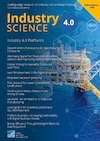Search


Bibtex
Cite as text
@Article{Karch+Bertagnolli+Leder,
Cite-key = "Karch2024Lea",
Year= "2024",
Number= "2",
Volume= "Industry 4.0 Science 40",
Pages= "32-39",
Journal = "Industry 4.0 Science",
Title= "Lean Empowerment in the Digital Ecosystem – Translating cultural values into technical requirements",
Author= "Sabrina Karch, let's dev GmbH & Co. KG, Frank Bertagnolli, Pforzheim University of
Applied Sciences, Arndt Lüder, Otto von Guericke University Magdeburg",
Doi= "https://doi.org/10.30844/I4SE.24.2.32",
Abstract= "With the advent of digitalization, prevailing paradigms – such as product centricity, face-to-face collaboration and hierarchical structures – are giving way to the vision of data-driven business models, digital, collaborative
ecosystems and an agile, holacratic way of working in flat hierarchies and self-managing teams. Collaboration is made possible through the use of
software solutions. In addition to adapted management concepts, the digital space also requires a digital cultural understanding on part of the companies involved. Lean empowerment is a pioneering approach to collaboration based
on cultural values. In expert workshops, ideas were developed to explore how these values can be lived in a digital culture and thus in terms of global digital
collaboration. This article presents concrete solutions from which requirements for digital collaboration and for implementation within IT structures and software solutions in particular can be derived.",
Keywords= "Digital collaboration, digital values,
lean empowerment",
}
Sabrina Karch, let's dev GmbH & Co. KG, Frank Bertagnolli, Pforzheim University of
Applied Sciences, Arndt Lüder, Otto von Guericke University Magdeburg(2024): Lean Empowerment in the Digital Ecosystem – Translating cultural values into technical requirements. Industry 4.0 Science 402(2024), S. 32-39. Online: https://doi.org/10.30844/I4SE.24.2.32 (Abgerufen 24.02.26)
Open Access
Abstract
Abstract
With the advent of digitalization, prevailing paradigms – such as product centricity, face-to-face collaboration and hierarchical structures – are giving way to the vision of data-driven business models, digital, collaborative ecosystems and an agile, holacratic way of working in flat hierarchies and self-managing teams. Collaboration is made possible through the use of software solutions. In addition to adapted management concepts, the digital space also requires a digital cultural understanding on part of the companies involved. Lean empowerment is a pioneering approach to collaboration based on cultural values. In expert workshops, ideas were developed to explore how these values can be lived in a digital culture and thus in terms of global digital collaboration. This article presents concrete solutions from which requirements for digital collaboration and for implementation within IT structures and software solutions in particular can be derived.
Keywords
Schlüsselwörter
Digital collaboration, digital values, lean empowerment
References
Referenzen
[1] Karch, S.; Lüder, A.; Listl, C.; Nowacki, N. S.; Hassan, K.; Werner, R.; Hohmann, T.; Müller, S.: Lean Engineering – Identifying waste in engineering chains. In: 56th CIRP Conference on Manufacturing Systems. Kapstadt 2023.
[2] Bertagnolli, F.: Lean Empowerment – Die konsequente Fortsetzung von Lean Leadership. Stuttgart 2023.
[3] Plattform Industrie 4.0; BMWi (Hrsg): LeitBild 2030 für Industrie 4.0 – Digitale Ökosysteme global gestalten. URL: www. plattform-i40.de/IP/Redaktion/DE/Downloads/Publikation/ Leitbild-2030-für-Industrie-4.0.pdf, Abrufdatum 24.10.2023.
[4] BMBF: Zukunft der Wertschöpfung – Forschung zu Produktion, Dienstleistung und Arbeit. URL: www.bmbf.de/SharedDocs/ Publikationen/de/bmbf/5/31662_Zukunft_der_Wertschoepfung. html, Abrufdatum 24.10.2023.
[5] Lernende Systeme – Die Plattform für Künstliche Intelligenz (Hrsg): Von Daten zu Wertschöpfung – Potenziale von daten und KI-basierten Wertschöpfungsnetzwerken. URL: www. plattform-lernende-systeme.de/files/Downloads/Publikationen/ PLS_Booklet_Datenoekosysteme.pdf, Abrufdatum 24.10.2023.
[6] Bühler, D.; Schneider, H.; Thiessen, T.: Plattformökonomie für den Mittelstand – von den Großen lernen, Vertrauen aufbauenden Einstieg wagen. In: Vernetzte Wertschöpfung – Plattformen, Wertschöpfungsnetzwerke und die Blockchain für Prozessund Geschäftsmodellinnovationen. Mittelstand-Digital Magazin, Wissenschaft trifft Praxis 12 (2019), S. 5-12.
[7] Hirsch-Kreinsen, H.; ten Hompel, M.: Digitalisierung industrieller Arbeit: Entwicklungsperspektiven und Gestaltungsansätze. In: Vogel-Heuser, B.; Bauernhansl, T.; ten Hompel, M. (Hrsg): Handbuch Industrie 4.0. Berlin Heidelberg 2015.
[8] Leimeister, J. M.: Collaboration Engineering – IT-gestützte Zusammenarbeitsprozesse systematisch entwickeln und durchführen. Berlin Heidelberg 2014.
[9] Herget, J.: Digitale Unternehmenskultur – Strategien für die moderne Arbeitswelt. Wiesbaden 2021.
[10] George, J. F.: Groupware. In: Encyclopedia of Information Systems. Cambridge 2002.
[11] Siepermann, M.: Social Software. URL: wirtschaftslexikon. gabler.de/definition/social-software-53586, Abrufdatum 24.10.2023.
[12] Liker, J. K.; Trachilis, G.: Lean Leader auf allen Management-Ebenen entwickeln – Ein praktischer Leitfaden. Winnipeg 2014.
[13] Bertagnolli, F.: Lean Management, 2. Auflage. Heidelberg 2020.
[14] Niederberger, M.; Ortwin, R.: Das Gruppendelphi-Verfahren – Vom Konzept bis zur Anwendung. Wiesbaden 2018.

 English
English